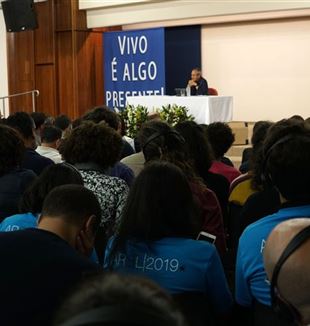
Latin America: “Awake, Heart!”
What can the method of Fr. Giussani bring to our lives? To this question speak the experiences of those living the charism in South and Central America. In Brazil, the first Equipe of college students and the Responsible's Assembly.The first Spanish Jesuit who arrived to these lands, St. José de Anchieta, who is counted among the founders of the city of São Paulo, built a tent in the midst of the indigenous people’s dwellings. They were cannibal tribes. At the entrance he wrote: “Pyápe Peiké Aé Peçauçuba», which the the tupi guaranì language means: “Enter, heart. Here dwells your love.” It was an invitation aimed squarely at the person and a home, even a small one, in which the people could eat, sleep, pray, receive care and instruction. “How certain would that man had to have been! How certain that the fact of Christ can establish a dialogue with man’s heart, no condition withstanding, thanks to a place that welcomes him.”
For Julián de la Morena, responsible of the Movement in Latin America, that initial experience of the Jesuit who evangelized Brazil describes, in a certain way, the experience of the charism. “It is in the reality of life that I can recognize Christ who says to me: ‘Awake, heart! I am here! I am here, now.’ Christianity can only be lived in the now. It can only be lived in the present and this is what we see happening among us.” At the Assembly of the Responsible's of Latin America with Julián Carrón, from the 29th to the 31st of March, just outside of São Paulo, the persons seated around the tables are as different as can be, for a multitude of reasons, but each one of them speaks of life with urgency and each is strangely grateful for the presence of the others who provoke them with their questions, putting them in crisis and again into motion. There is a striking desire in everyone, regardless of their age, to learn from another what is the substance of their own experience.
What allows Vivian to experience a fullness even in front of the sickness of her young husband? Or permits Gerónimo to realize, within a crisis at work and in his family that exploded on him, that the one who needs to change is precisely him? What makes it possible for the Chileans to rediscover the beauty of Christianity in a Church torn apart by scandal, and for Gabriella, a Venezuelan refugee in Colombia, to give thanks for the fact that she has lost everything? She herself states the reason: “It is because I have discovered the concrete embrace of Christ in my life,” she says. In the same way, Eduardo can tell how his own personal fragility is cured by “a good use of his reason”: “I am able to not have to escape in front of my imbalances, thanks to a path that is allowing me to discover the profundity of my person.” And only because of this discovery, he can, in turn, look with truth at the fifty young people, “wounded like me”, whom he takes care of in his non-profit. 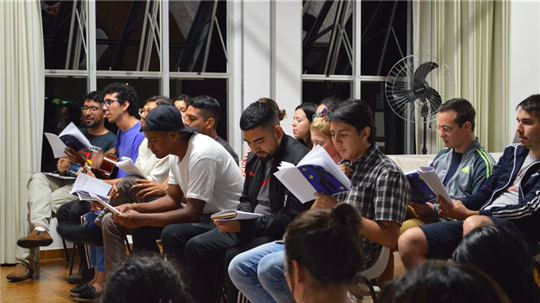
These are stories and judgments that we will explore more deeply in the next issue of Traces and that accompanied the intense work of the days in São Paulo, marked by the rediscovery of them method of Fr. Giussani. “We can follow in such an abstract way as to arrive at negating our own method. We can lose the charism by the wayside,” Carrón says, challenging the more than three hundred people gathered from almost thirty countries, from Mexico to Argentina. We are chosen, he says, “by the initiative of God who goes before us all, but not to live an exclusivity. Grace is given to us for the world,” he underlines the first evening. “We can live everything with the consciousness that One loves us to the point of giving us existence. The first help we can be for one another is to lend a hand in reconquering this awareness.” Carrón is certainly also referring to what he had seen in the preceding days, when forty young people gathered for the first Equipe of CLU students of South America: “For them, being here was not to be taken for granted; they all felt the disproportion of not being worthy. And no one deserves it, actually. Therefore, the totally gratuitous preference of Christ for us is the first piece of evidence that imposes itself; it is the first thing to which we must look! If we are simple, it prevails over everything.” It prevails over every interior state of ours, and over everything that may happen to us.
“Why me?” The wonder encapsulated in those words came out for all of the college students as soon as they opened their mouths in the assembly. This wonder came before any other consideration, before all of the problems and the questions that they had, which were on many topics: on their usefulness for the world, on their incapacity to forgive, on solitude, on the School of Community, on the desire that things last, on affective relationships and on marriage, on studies and on the form of their vocation ... They were asking these questions to Carrón with great freedom, who was responded with another series of questions. In this way, the three assemblies were a dive into and immersion in experience, a continual excavation of what we say and why we say it,” some students said at table as they continued the discussion amongst themselves. “He wants us to become free. For this reason, he doesn't let even one word slip away.” Some of the students had never seen him, and yet they were waiting for him as if waiting for a father, certain to find a confident help, at the origin of the life that has reached them. In order to go deeper, they take advantage of every occasion, even when the three hundred participants of the Responsible's meeting arrive and the work becomes dilated.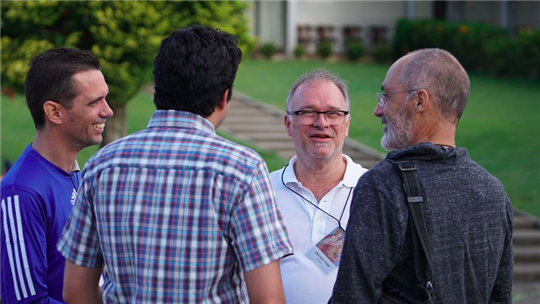
“The greatest grace is to be able to make a journey,” Carrón repeats. “And this journey does not coincide with our busyness in the life of the Movement, but with the generation of a person who is able to face the challenges of life.” The story of Alejandro from Argentina is illuminating. He speaks of his “increase in self-awareness.” He had lived thirty four years in the Movement, “thinking presumptuously to be following Giussani” and without realizing that he had always left it “outside” of himself: “This is because I never truly implicated my own humanity. As I began to do this, everything became new.” Similarly Otoney, of Salvador de Bahia, put everything into the life of the Movement and “I would ask myself why in the community we were not ever growing in number, without seeing that the novelty is my own person. I am still a ‘wild horse’ but there is a Presence within me that allows me to live my work, my family life and my responsibilities in a way that is not just my own. Now, I am once again here so that I can be corrected by you.” Fr. Ernesto, of Peru, had only recently met the Movement. “I could not have imagined to find such a place in the Church.” He adds: “When I repeat words or ideas of Giussani without them having become mine, I am not happy and I do not help the others. Nothing happens...” “Everything is different when it is an experience!” Carrón interjects: “We reduce the charism to a series of words. Only our loyalty to ourselves can recognize the difference. We are together in order to help one another to not lose the novelty that Giussani introduced into the form of the way that we live our faith: the nature of Christianity lies within an event that happens. It is an event that happens and makes life blossom, even in the most extreme conditions.”
The friends from Venezuela come from a country in agony and which for weeks now has lived in the dark due to the intermittent blackouts. Their stories are the point of comparison for each person at the Responsible's meeting, not just for the challenges they are facing but for the lightness, the constructiveness and the peace with which they are living those daunting challenges. “There is a protagonism possible,” Carrón goes on, “If one follows the story that has reached him.” And we can see this is true in those who, once they are reached, do not ever leave again. All present saw this in Jesus Carrascosa, known as “Carras” by all, and it is the reason why his testimony filled everyone with hope and with healthy envy, to be able to arrive to eighty with that same vitality of the heart. His birthday was during the first day of the meeting and, in the midst of all of those friends, he was celebrated as if they were his children. During the evening, he tells of the passionate and anarchic fight in the Spain of Franco, of the commitment to working for the poor, of a militant “faith” in which Christ was not a presence. He then spoke of a ferocious crisis of ideals and of a trip taken in a Ford to Italy to meet “the old one” (Giussani) of whom many had spoke to Carras and who will turn the life of him and his wife upside down forever, passing through the corners of the history of CL and of the world, relationships with the Popes, international responsibilities for the Movement and an always growing desire that “one day, even for me, Christ can be as real as He was for Fr. Giussani.” In the end, thanking him, De La Morena explained what had filled the meeting room with wet eyes, due to both the emotion and the laughter: “In you, it is evident that giving your life for the work of Another is not a renunciation but a feast.” 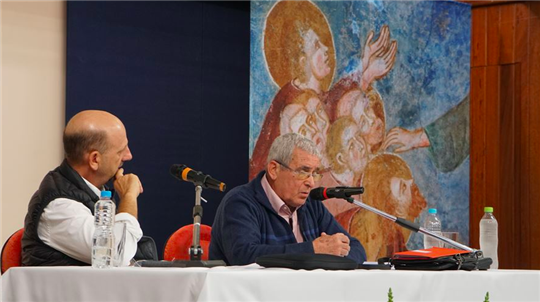
It is an experience that can be seen in the joy of the volunteers who lend a hand at the Equipe. Pilar, in her first year of college, spent a month of her vacation helping to prepare, because her dream was “to see the place from which my parents always return so happy.” Ergison is twenty-five and was baptized at twenty-one. His admission is simple: “I am scared to lose the fullness that I am living.” “You must be aware of Who it is that gives it to you. Only in this way can you overcome your fear,” Carrón responds to him. “Who produces it? The disciples the day after returned to seek Him out. In the same way, we can belong to the reality in which the Mystery gives us happiness.”
After him, listening to the young Paula, of Rio de Janeiro, is like seeing the words of The Religious Sense come to life: “For me, something great is not enough; I want everything!” Carrón jumps in his seat: “I want everything! Everything! This is the Movement! It is the belonging to a place that opens up your nature to the point of desiring to be totally fulfilled.” Christ came into history in order to bring out the full depth of the soul: “It is only because He can fill your heart that He throws it wide open.” He puts back in front of everyone that only a Christian can speak in this way of desire and that this brings us to the question of questions: is such a faith still possible for us today? 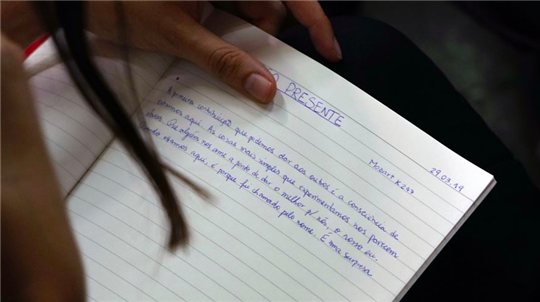
“It is possible,” he will go on to say in his final remarks, “because the heart is made of an inextinguishable aspiration towards the infinite. The work to which Giussani invites us is that of his first hour of teaching: we must learn a true way of judging reality. There is a fundamental aspect of this education: experience. We must brandish the nostalgia for totality that makes us up and we must compare everything to it. The problem is if we involve our humanity.” A simple example of this was the most striking: “When health begins to decline, we are immediately aware of it. And words are not enough in that situation. And yet, in life, we abuse words, like 'freedom', and it is rare to see free persons. It is necessary to be aware of the difference in our experience! Otherwise, we will not see how faith responds to the needs of life, which is the reason why Fr. Giussani began the Movement.” It is for the same reason that it continues today: “It continues not so that we can keep an association on its feet, but for the experience of life that it gives us.”
The vans depart in droves. The Venezuelans have an overnight flight. Some Brazilian friends help them to fill their suitcases with clothes and donated medicine, and will stay with them in the airport, singing together, until the last moment. In his testimony, Carras cited a verse of the Spanish poet León Felipe, about God: Vino, nos marco nuetra tarea y se fue: "He came, He left us a task and after he left.” And Carras' comment on these words? "This poet is mistaken."